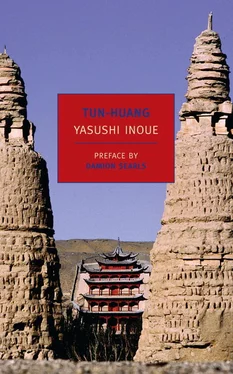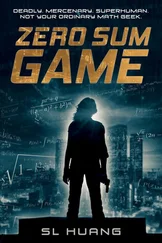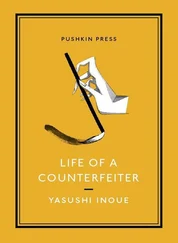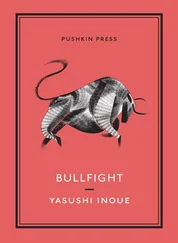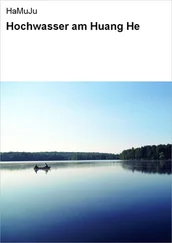“I loved her,” Wang-li sighed.
“Was that all? You just loved her?”
Wang-li was silent for a while, then he looked straight ahead and replied. “I don’t know how she felt. I just know I loved her. After I took her, I just couldn’t be without her. I still love her.”
It was very difficult to understand Wang-li, but Hsing-te did not miss a single word. So Wang-li had taken that Uighur woman. It had happened, after all. Now that Hsing-te’s vague suspicions were proven true, he felt a rush of angry words ready to spill forth, but with great effort he managed to control himself.
“And how did you get that necklace?” Hsing-te asked again. He was trembling.
“When Yüan-hao took her from me, I wanted something — anything — of hers.”
“Did she give it to you?”
“No. I started to take it. But when I put my hand on her necklace, she quietly slipped it off and gave it to me.”
Wang-li turned abruptly and stared at Hsing-te, as though to say, “If you have anything to say, just try it.”
Hsing-te remained silent. Then Wang-li spoke. “In any case, I’m going to get that Yüan-hao. You do as you wish; if you don’t care to join me, you can leave the city now.”
In reply, Hsing-te said, “I’ll help. Do you think I’m afraid of Yüan-hao? Do you think I would run away?”
Hsing-te was enraged. But strangely enough, he felt no animosity toward Wang-li, who sat before him. Did he have any right to blame or hate Wang-li, even though he had forcibly taken the Uighur girl? It was he who had left the girl in Wang-li’s care, and he who had not returned on the day he had promised. There was nothing he could do if Wang-li had loved the girl more than he.
Yüan-hao, however, had dragged her off, merely to add her to his large harem. And he had, in effect, killed the beautiful girl. If Wang-li was going to kill him, he would help him put an end to the villain. Wang-li’s anger had now infected Hsing-te as well.
The only difference was that Hsing-te was slightly more objective. He didn’t think, as Wang-li did, that it would be a simple matter to assassinate Yüan-hao, the ruler of a country. They might succeed, or they might not. If they did, all would be well. If they were unsuccessful, then the repercussions were unthinkable. In all probability, the entire Chinese populations of Kua-chou and Sha-chou would be drawn into the incident.
Hsing-te visited Governor Yen-hui daily at his palace and tried to allay his fears, as Yen-hui had become semi-paralyzed with fear since he learned that the Hsi-hsia main army was invading Kua-chou and Sha-chou. Yen-hui vacillated almost every day as to his plans. One day he would decide to welcome the Hsi-hsia main army quietly; the next day he would think of abandoning the city and moving to Sha-chou where he would try to stop the Hsi-hsia invasion. Although Hsing-te was a member of the Hsi-hsia army, the fact that he was Chinese placed him in the curious position of governor’s consultant.
Until then Hsing-te had felt that a Sha-chou and Kua-chou challenge to the mighty Hsi-hsia was definitely unfavorable and should be avoided. The present strength of the Ts’ao dynasty in Sha-chou was negligible. Even if they should gather together their entire military force, it was obvious that they were no match for the intrepid, battle-hardened Hsi-hsia soldiers. It would be much wiser to allow the Hsi-hsia army to occupy the land peacefully. The Ts’ao family and all the other Chinese could certainly retain some of the privileges and wealth they had accumulated over the years. Looking back on events at Kan-chou and Liang-chou, Hsing-te did not think the Hsi-hsia army would be especially harsh.
If, however, the Hsi-hsia vanguard should revolt, the implications would be quite different. Because the Ts’ao family and the vanguard were both of Chinese blood, the Hsi-hsia would certainly conclude that they were rebelling in defense of Kua-chou and Sha-chou.
When Hsing-te mentioned this to Wang-li, Wang-li spat our hoarsely, “Stupid!” He repeated, “Stupid! Yüan-hao will slaughter the Ts’ao to the last man. He will draft all able-bodied men in the cities into his army, and will probably enslave all the women. And the men forced into conscription will end up in the battle when war with China begins. Things are different from Te-ming’s time. Whether or not Sha-chou and Kua-chou resist doesn’t matter, the result will be the same. Yüan-hao is that kind of man. We must also kill that bastard for the sake of our fellow Chinese.”
Then Wang-li went on to explain what he and his men had seen of the Hsi-hsia army during the year of their battles with the Turfans. In Ch’ing-t’ang the Hsi-hsia army had slaughtered thousands of women and children. For Hsi-hsia, the common enemy of both China and the Turfans, it was necessary to commit such atrocities in order to win. The forthcoming battle would be the same. Wang-li’s voice was barely a whisper, but Hsing-te leaned close to him. As he was now accustomed to his speech, he found he could understand him more easily.
Dusk was settling in the city, and the savage soldiers, who had returned from ten months of battle, were drunk with wine and creating disturbances. Angry voices and shouts echoed through the open space by the city wall.
“Don’t let the soldiers sleep in barracks. Have them sleep here,” Wang-li ordered Hsing-te. He did not want his men, who still had the smell of blood on them, to lose the spirit of the battlefield. “At dawn, give the call for all defense troops as well as Yen-hui’s men, and have them wear full military dress. The weapons will be bows and arrows. We’re going to shoot all the arrows we can at Yüan-hao.”
Wang-li rose from his seat, made his way through the groups of soldiers, and started to walk toward his quarters. Hsing-te followed, hoping to consult him about the method of attack on Yüan-hao and the positioning of the troops for battle.
As Wang-li arrived at his house, Chiao-chiao rushed out. Wang-li looked at her tenderly and said something to her, but Chiao-chiao could not understand him either. Hsing-te thought that Wang-li called out, “Chiao-chiao,” but he no longer heard that peculiarly tender tone Wang-li had once used.
After Hsing-te left Wang-li, he went to Governor Yen-hui’s palace to tell him of Wang-li’s order to evacuate the civilian population before the following morning. Hsing-te told him only that the town might become a battlefield, but gave no further explanation. Hsing-te had expected Yen-hui to faint from shock upon hearing this message, but Yen-hui’s expression changed little; he nodded his head slowly and said, “I agree. If we evacuate, trouble between the Hsi-hsia troops and the civilians may be avoided. This city, the temples within its walls, and the sutras will not be burned.
Yen-hui immediately called a subordinate and instructed him to order all civilians in the town to evacuate.
After that, Hsing-te was kept busy until midnight. Removing the weapons from the armory alone required the help of thirty soldiers. It was late at night when he finished. The town was quiet. Hsing-te had expected great confusion everywhere, and thought it strange that it was still quiet even after midnight.
Hsing-te again went to Yen-hui. Yen-hui’s spacious palace, too, was absolutely still. When Hsing-te entered, Yen-hui was buried in a large chair in the center of the room, which was brightly illuminated by several candles, and he appeared to be unconscious. The room was heavy with the pungent odor of burning hemp oil. Hsing-te asked Yen-hui whether the evacuation order had been transmitted to the civilians.
“I have taken care of everything,” replied Yen-hui.
“But the town is so quiet. It doesn’t seem as though people are preparing to evacuate.” When Hsing-te said this, Yen-hui cocked his ear slightly, then pushed open the door and went outside to climb the watchtower. He returned shortly and said, “You’re right. The town’s quiet. It’s very odd.”
Читать дальше
